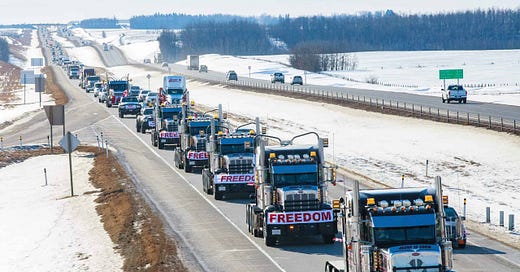Over the last week, I’ve been in shock over the scale of the Dutch farmers’ protest. It might make the Canadian Freedom Convoy look like a weekend picnic. Canada is a big country, yet some of its key trading routes with its largest trading partner, the United States, were blocked for days by protesters. The Netherlands, it seems, is completely cut off by its farmers who have used tractors to bring the country to a halt. In solidarity with them, fishing boats have similarly blocked ports. While Schiphol airport seems functional, other airports have been closed. The goal of the farmers is “for the entire country to be paralyzed”. I can’t be quite certain about the details of the protest, because the second most shocking thing in the last week has been the near complete blackout in news coverage by western news media.
The Dutch protest began when the government passed legislation aimed at reducing the country’s greenhouse gas emissions. In doing so, they set requirements that, by the government’s own acknowledgement, could lead to the closure of 30% of livestock farms. Agricultural products, including meat and dairy, are the Netherlands’ largest export. How is it that a country’s political elites pass legislation that destroys a third of its largest economic sector? How is it that they do so at a time when one of the world’s largest exporter of agricultural products - Ukraine - is in turmoil and much of the world is at risk of going hungry?
Let’s think about how legislation aimed at curbing the environment impact of farming might have been introduced in saner times. Normally, government committees in charge of drafting such legislation would seek input from a wide range of experts to understand the problem domain, and they would also seek input from their constituency - the people who would be most impacted by the legislation. Various alternatives would have to be considered. In this case they might be: do we fully stop agricultural activities? If yes, what happens to the people who rely on the economic activity and the people who rely on its products? How do can we make them whole?
If we don’t stop the activity completely, how do we transition to a model where its environmental impacts are minimized? Is new technology available with better environmental impact profiles? Can its adoption be incentivized? Can the polluting practices be gradually disincentivized?
These considerations seem to have either not taken place or were poorly done in the case of the Dutch law. And the likely reason for that is that the Dutch government was under pressure from the EU governance bodies to meet certain arbitrary emission targets by 2030. In other words, these arbitrary targets were actually decided on by a legislative body that is detached from the constituents it governs.
But there is another reason why the constituents did not factor in this legislative process: the ruling elites in much of the western world have nothing but contempt for the lowly working classes and nothing but self-righteous conviction in their own role as saviours of the world. Remember that these same European legislators spent years crippling their energy sector – thereby making themselves dependent on Putin – in the name of their climate ideology. Just as they’re doing an aboutface on that front, they’re now bringing their central planning wisdom to the field of agriculture.
From Clinton’s “basket of deplorables” to Trudeau’s “fringe minority”, the world elites’ contempt for those who don’t share their worldview (that is, the people who do real work for a living) has been on display for years. Political elites from around the world have more in common with each other today than they do with the people over whom they rule. Their echo chamber reinforces their narcissistic, self-aggrandizing attitude and their conviction in their role as righteous saviours. This makes them dangerously unable to absorb any criticism of their ideology, whether on climate change or COVID. The word that I can keep coming back to when thinking about the Dutch legislation is “Maoist” – technocrats who know nothing about agriculture, believing they can set ideologically-motivated dictats on farmers – in the midst of a worldwide food crisis no less – with tragic consequences to follow.
When faced with a similar backlash, the Canadian government decided that turning off its citizens’ fundamental rights was more palatable than engaging in dialogue with them. We will see how the Dutch government handles the current crisis. I’m afraid, though, that as this trend continues, the elites in power will resort to increasingly authoritarian tactics to advance their agenda. They have already demonstrated willingness to do so. The response to this will not be pretty.
Already, in quiet Canada, we have had one violent incidentwhere suspects who were reportedly radicalized by their perception of increasing government tyranny got into a shootout with police. The truth is that their perception was not incorrect. They’re the canaries in the coal mine, showing us what happens when people increasingly feel they have no other way to make themselves heard. And over a long time, if enough people feel that way, then trucks and tractors will give way to guillotines.





This article has stood up very well in the almost 3 years since it was written. Worldwide elites are cracking down on dissent, calling it disinformation, which is a lie.